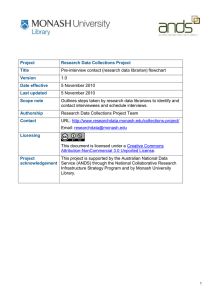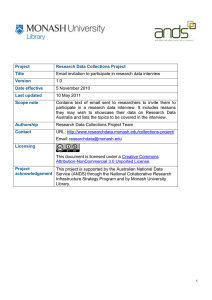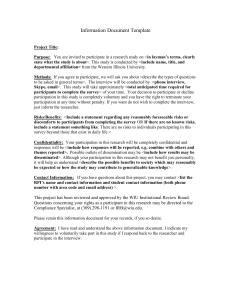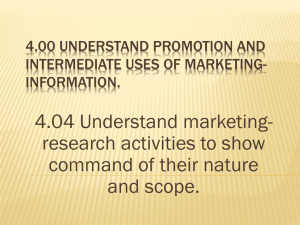Building skills and toolkits for research data interviews
advertisement
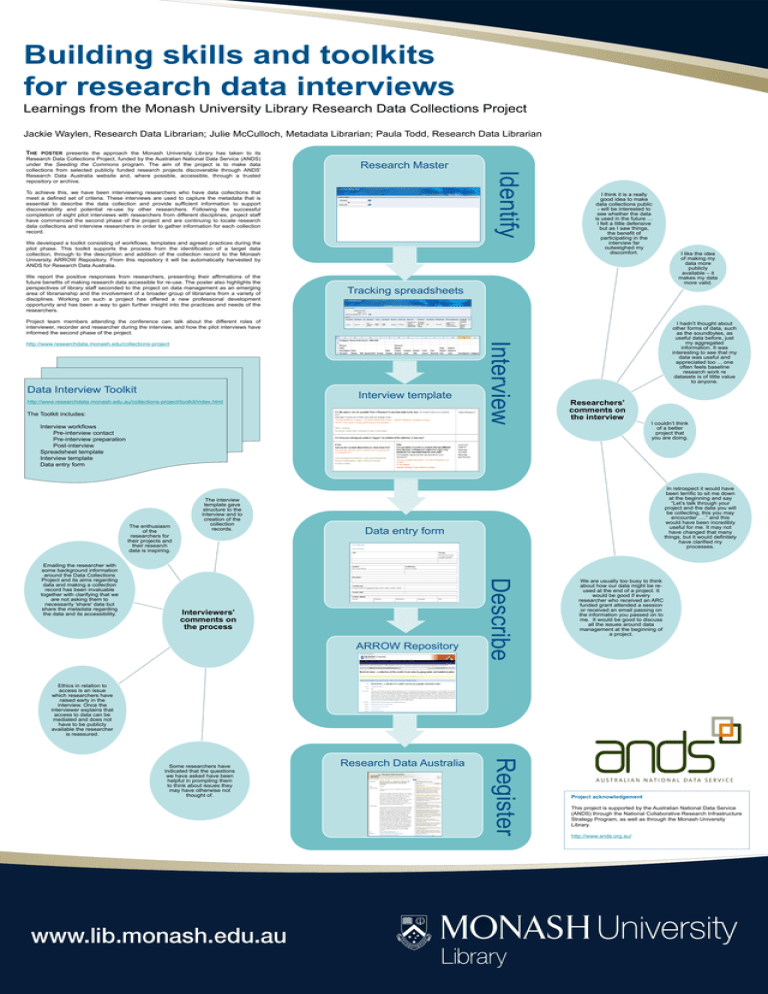
Building skills and toolkits for research data interviews Learnings from the Monash University Library Research Data Collections Project Jackie Waylen, Research Data Librarian; Julie McCulloch, Metadata Librarian; Paula Todd, Research Data Librarian THE POSTER presents the approach the Monash University Library has taken to its Research Master Identify Research Data Collections Project, funded by the Australian National Data Service (ANDS) under the Seeding the Commons program. The aim of the project is to make data collections from selected publicly funded research projects discoverable through ANDS’ Research Data Australia website and, where possible, accessible, through a trusted repository or archive. To achieve this, we have been interviewing researchers who have data collections that meet a defined set of criteria. These interviews are used to capture the metadata that is essential to describe the data collection and provide sufficient information to support discoverability and potential re-use by other researchers. Following the successful completion of eight pilot interviews with researchers from different disciplines, project staff have commenced the second phase of the project and are continuing to locate research data collections and interview researchers in order to gather information for each collection record. We developed a toolkit consisting of workflows, templates and agreed practices during the pilot phase. This toolkit supports the process from the identification of a target data collection, through to the description and addition of the collection record to the Monash University ARROW Repository. From this repository it will be automatically harvested by ANDS for Research Data Australia. We report the positive responses from researchers, presenting their affirmations of the future benefits of making research data accessible for re-use. The poster also highlights the perspectives of library staff seconded to the project on data management as an emerging area of librarianship and the involvement of a broader group of librarians from a variety of disciplines. Working on such a project has offered a new professional development opportunity and has been a way to gain further insight into the practices and needs of the researchers. I think it is a really good idea to make data collections public - will be interested to see whether the data is used in the future … I felt a little defensive but as I saw things, the benefit of participating in the interview far outweighed my discomfort. Tracking spreadsheets Project team members attending the conference can talk about the different roles of interviewer, recorder and researcher during the interview, and how the pilot interviews have informed the second phase of the project. http://www.researchdata.monash.edu.au/collections-project/toolkit/index.html Interview template The Toolkit includes: Interview workflows Pre-interview contact Pre-interview preparation Post-interview Spreadsheet template Interview template Data entry form The enthusiasm of the researchers for their projects and their research data is inspiring. I hadn't thought about other forms of data, such as the soundbytes, as useful data before, just my aggregated information. It was interesting to see that my data was useful and appreciated too ... one often feels baseline research work re datasets is of little value to anyone. Researchers’ comments on the interview I couldn’t think of a better project that you are doing. In retrospect it would have been terrific to sit me down at the beginning and say “Let’s talk through your project and the data you will be collecting, this you may encounter ….” and this would have been incredibly useful for me. It may not have changed that many things, but it would definitely have clarified my processes. Data entry form Interviewers’ comments on the process ARROW Repository Describe Emailing the researcher with some background information around the Data Collections Project and its aims regarding data and making a collection record has been invaluable together with clarifying that we are not asking them to necessarily 'share' data but share the metadata regarding the data and its accessibility. The interview template gave structure to the interview and to creation of the collection records. Interview http://www.researchdata.monash.edu/collections-project Data Interview Toolkit I like the idea of making my data more publicly available – it makes my data more valid. We are usually too busy to think about how our data might be reused at the end of a project. It would be good if every researcher who received an ARC funded grant attended a session or received an email passing on the information you passed on to me. It would be good to discuss all the issues around data management at the beginning of a project. Ethics in relation to access is an issue which researchers have raised early in the interview. Once the interviewer explains that access to data can be mediated and does not have to be publicly available the researcher is reassured. Research Data Australia Register Some researchers have indicated that the questions we have asked have been helpful in prompting them to think about issues they may have otherwise not thought of. Project acknowledgement This project is supported by the Australian National Data Service (ANDS) through the National Collaborative Research Infrastructure Strategy Program, as well as through the Monash University Library. http://www.ands.org.au/
